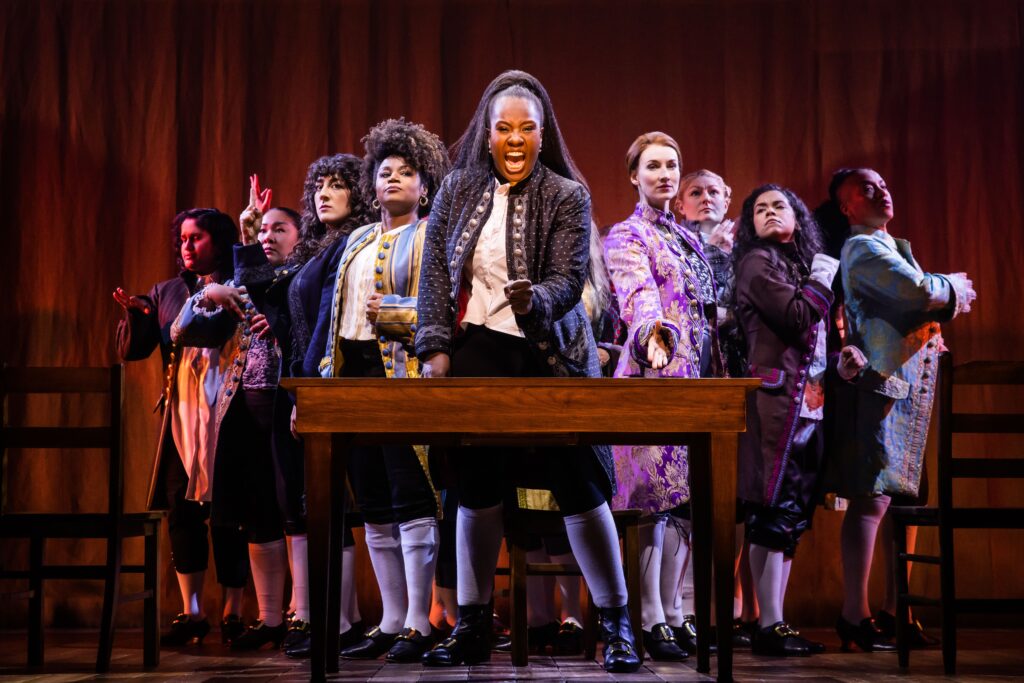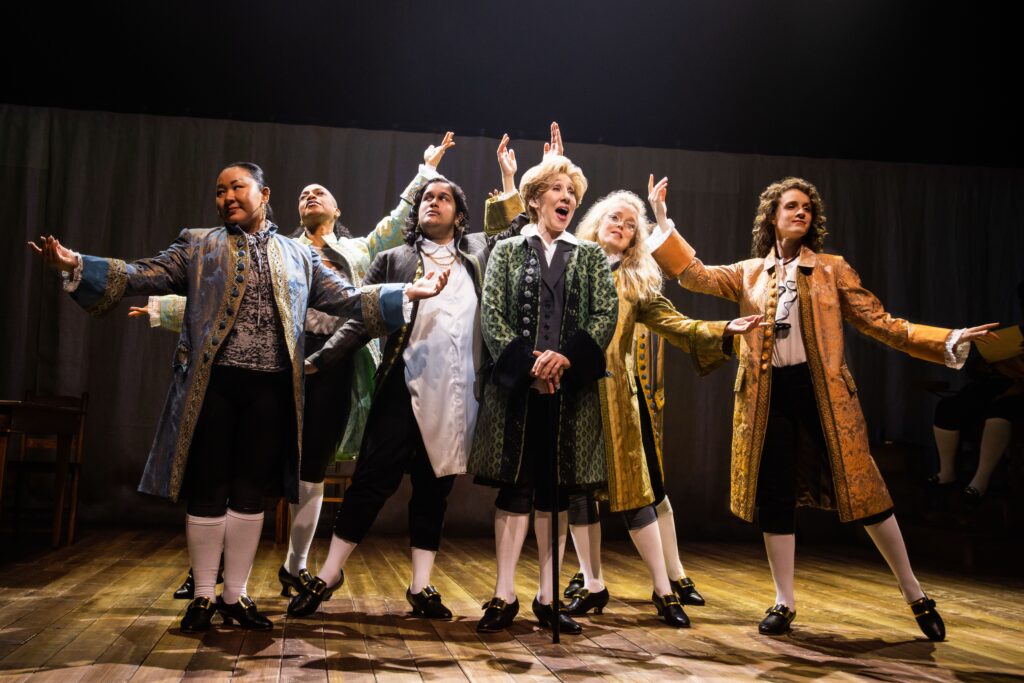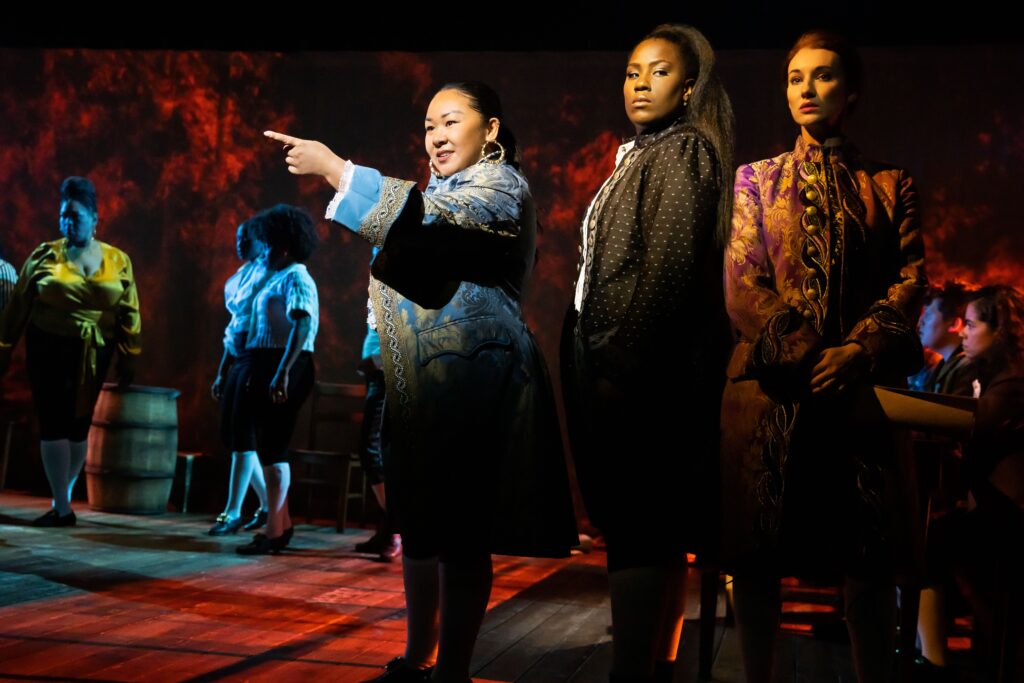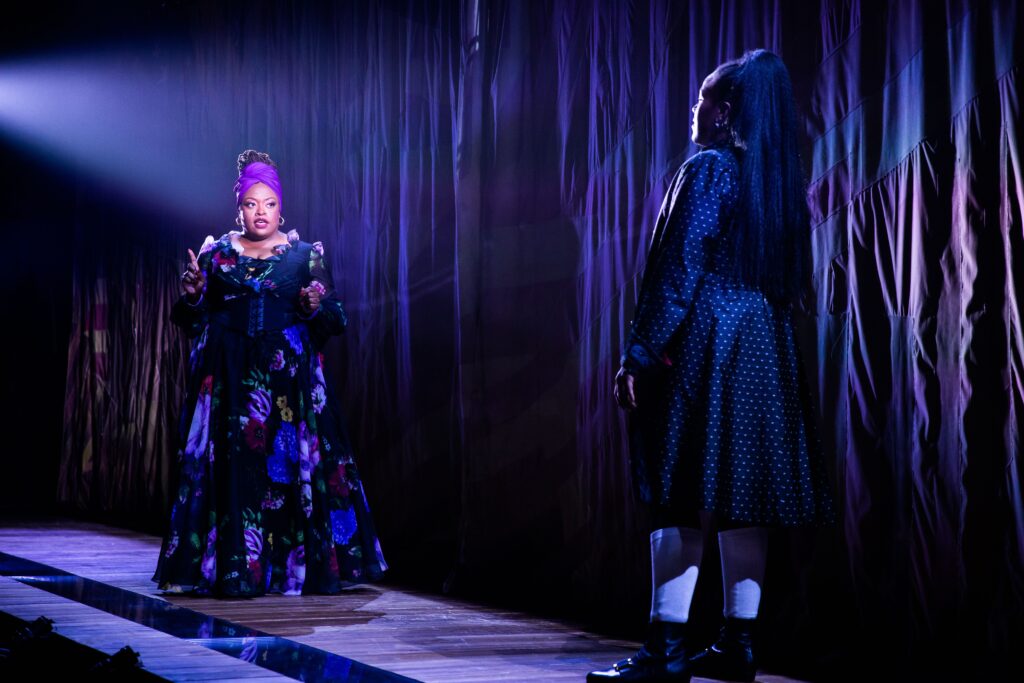
‘1776’ – Music and Lyrics by Sherman Edwards; Book by Peter Stone; Based on a concept by Sherman Edwards Directed by Jeffrey L. Page and Diane Paulus; Choreography by Jeffrey L. Page; Music Direction by Ryan Cantwell; Scenic Design by Scott Pask; Costume Design by Emilio Sosa; Lighting Design by Jen Schriever; Sound Design by Jonathan Deans; Projection Design by David Bengali. Co-presented by the Roundabout Theatre Company (RTC) and the American Repertory Theatre, at the Loeb Drama Center, 64 Brattle St. Cambridge through July 24th.
by Mike Hoban
I must admit I was not overly enthused on my way to Brattle Street for the pre-Broadway opening of the musical 1776. The A.R.T.s 2021-2022 season, with the exception of the marvelous opening tap showcase, Ayodele Casel: Chasing Magic, has largely been one of well-intentioned activism superseding any meaningful art, resulting in a string of preaching-to-the-choir productions that made me long for the dopey good fun of something like Waitress (which also had a pre-Broadway opening at the A.R.T.). A pair of climate change-themed shows Wild (great score, but a book that seemed like it was penned by Sid & Marty Kroft of “H.R. Pufnstuf” fame), and the spectacularly dreadful Ocean Filibuster made me wonder if this once-venerable institution had lost its way and would no longer deliver the creative energy blasts of shows like Six, Jagged Little Pill, The Black Clown, and Natasha, Pierre and the Great Comet of 1812.
So when it was announced that A.R.T. was producing a diverse version of the Tony-award winning 1776, a musical about the founding of America by mostly rich white guys, featuring a cast comprised of performers who identify as female, non-binary, and trans, my cynicism remained. Thankfully, I’m more than happy to report that not only was my skepticism unfounded, 1776 is a solid production that is alternately thought-provoking and joyous.

1776 tells the story of the two-month period of debate to decide whether or not the colonies should declare independence from England. And while we all know how it turned out, it was eye-opening to see how close the American experiment came to dying on the vine – and the unholy compromise it took to close the deal. The musical was first performed in 1969 and retains the irreverent feel of that era, portraying founders John Adams, Thomas Jefferson, Benjamin Franklin and the rest of the founders not as the celestial beings of our junior high history books, but as three dimensional characters with human (and inhumane) flaws – including outsized egos, and in some cases, a monstrous sense of privilege. The play is also loaded with humor, particularly from the lips of Franklin (the droll Patrena Murray) and pretty much anyone he’s speaking with.
The campaign for independence is spearheaded by Adams (a fiery Crystal Lucas-Perry) and assisted by Richard Henry Lee of Virginia (an over-the-top but enjoyable performance by Shawna Hamic), whom Adams cajoles into proposing the motion because Adams knows that he is considered both “obnoxious and disliked” by his fellow delegates and is unlikely to drum up the necessary support for the measure. After dodging a number of attempts to choke the idea in its crib, led largely by John Dickinson of Pennsylvania (Joanna Glushak, who embodies the essence of monied privilege with her performance), Adams makes another proposal – to write a “The Declaration of Independence” to allow he and his cohorts time to try and win over the doubting delegates. After being rebuffed by a number of delegates, Adams turns to Thomas Jefferson (wonderfully underplayed by Elizabeth A. Davis, who also plays the violin) to write the masterpiece that is The Declaration of Independence – even if it does fall far short of its promise in actuality. In fact, the clause that would abolish slavery is struck from the final version as a condition for securing the votes of the southern states – something that would not be rectified for nearly a century.

The story is compelling, and while the score may lack songs that belong in the American Songbook, the it delivers two powerful gems, the anti-war “Mama Look Sharp” that reminds us that the moneyed class starts the wars and the working class bears the brunt of those actions; and the most powerful song of the evening, “Molasses to Rum,” which sets the record straight on the role that “enlightened” states like Massachusetts played in the cold-blooded slave trade. Sung by Rutledge (the brilliant Sara Porkalob, making her return to Cambridge three years after her stunning “Dragon Cycle” shows at Oberon), it excoriates the Northern delegates for their hypocrisy in condemning the southern states while reaping the riches generated by providing the shipping necessary to transport slaves to America. In addition to the heavier songs, the double-entendre number “He Plays the Violin” is another standout, sung beautifully by Eryn LeCroy as Martha Washington (she also plays Georgia delegate Dr. Lyman Hall).

It’s hard to hard to not draw parallels between the origin story of America and what is going on in today’s political climate. Moneyed interests are still winning out over doing what is morally responsible, and the will of the people – whether it be providing healthcare to all or keeping the populace safe from assault weapons – is largely ignored. There’s a line from Franklin in the play that is hauntingly prescient:
“We’ve spawned a new race here, Mr. Dickinson,” he says. “Rougher, simpler; more violent, more enterprising; less refined. We’re a new nationality. We require a new nation.” Unfortunately, it looks like we may be getting one, and it won’t be pretty. In the meantime, 1776 is an entertaining diversion, and well worth seeing. For tickets and more information, go to: https://americanrepertorytheater.org/


I have seldom seen such a good execution of something so pointlessly ridiculous.
I spent the first half of the performance in near despair as I imagined what kind of campaign ads this will be turned into for the fall 2022 elections.
One day there will be a musical about Nelson Mandela and the overthrow of Apartheid. Because of the groundwork laid here no one will think casting a white transvestite as Nelson Mandela is ridiculous.